
Image: XR Global
Dear Rebel,
This month, the world celebrated its victories. Renewables surpassed coal as a source of energy in the first half of 2025. In Ecuador, the Waorani won a major legal battle to protect their land. And in Israel and Palestine, hostages and prisoners were finally released to their homes. Yet even as we acknowledge these and other valuable steps towards peace and sustainability, there is the sense that we are holding our breath. We are thinking about how these wars have gone on longer than we could have imagined, how emissions have remained higher than we dared fear. We are asking, what is the difference between a ceasefire and a peace pact? We are asking, what is the difference between less coal and no coal? And how can we not have doubts when, in just this same month, scientists announced that we have reached our first climate tipping point, and the last ship in the Gaza-bound humanitarian aid flotilla was intercepted?
The people comprising the Global Sumud Flotilla knew the effort and risk involved in their endeavor. After all, they chose the name Sumud, which means steadfast perseverance in Arabic. So while the flotilla may have disintegrated, we must not let our hopes for peace and prosperity do the same. That is why, across the globe, Extinction Rebellion activists are carrying out tireless acts of civil disobedience and gearing up for more. And if, after reading this newsletter, you wonder how you might contribute to this spirit of perseverance, we would suggest that it might start with small steps. You might reach out to your local XR group. You might help our Latin American groups hold mass protests at this year’s COP. You can also talk to us through our anonymous reader survey and tell us how we can better tell the ongoing story of those who keep on keeping on.
XR Global Newsletter Reader Survey
This newsletter is brought to you by XR Global Support, a worldwide network of rebels who help our movement grow and need money to continue this crucial work.
[DEFEND THE AMAZON]Action Highlight
The Amazon is Burning. We’re Fighting Back.
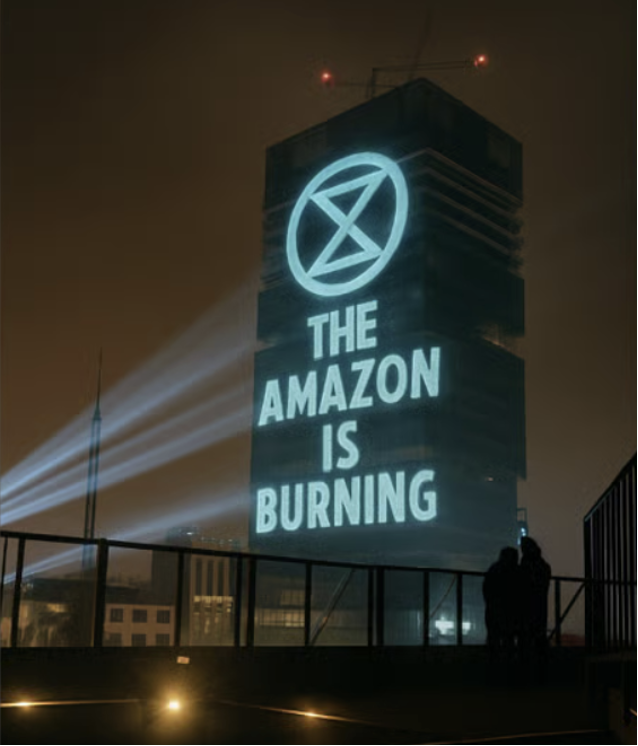
Photo: XR Global
November 2025 | Latin America
COP30, the annual UN conference on climate change, is being held in Belém, Brazil from November 10th to 21st. Extinction Rebellion Latin American chapters will be protesting this event by holding actions all across the continent. 30 years on from the first COP and after 30 years of broken promises, our planet is at an inflection point.
While world leaders get cozy with agri-businesses and fossil fuel lobbyists, Indigenous communities and activists across Latin America are organizing the largest coordinated resistance in the region’s history. We’ll disrupt COP30 with 40 powerful actions across 10 countries – blocking illegal mining, amplifying silenced voices, and proving that real climate solutions come from the people, not politicians.
But we need funds to train activists, support direct actions, and make sure the voices protecting our planet’s lungs can’t be ignored. We must stop the destruction of our forests, the ravaging of our lands, the poisoning of our food and water, and the forced displacement of our Indigenous sisters and brothers. The forest can’t wait. Neither can we. We will not simply stand by. But we need you to stand with us. COP30 in Brazil might be our last chance to show those in power that the Amazon has the power of millions behind it – and that we will never back down. Show your support here.
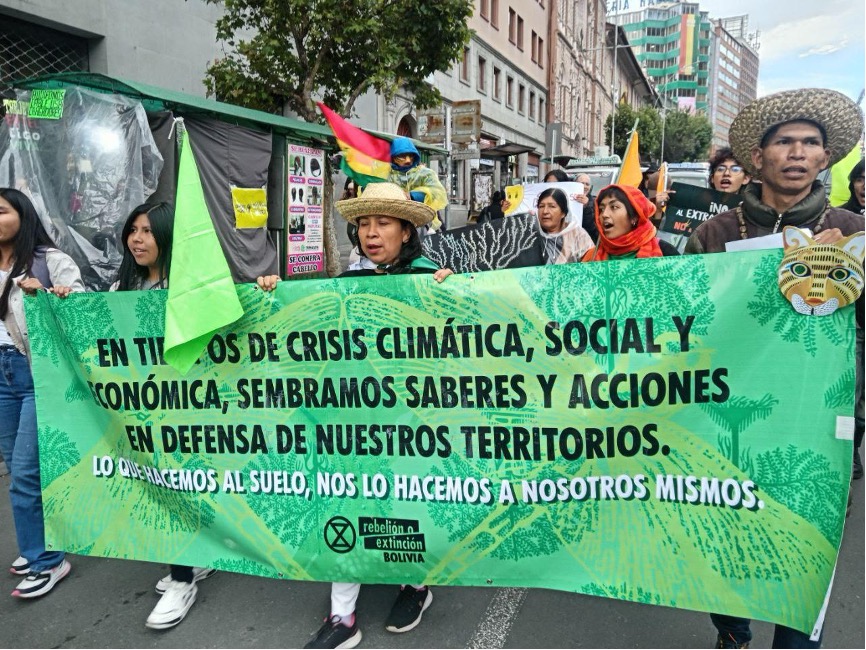
Photo: XR Bolivia
Action Roundup
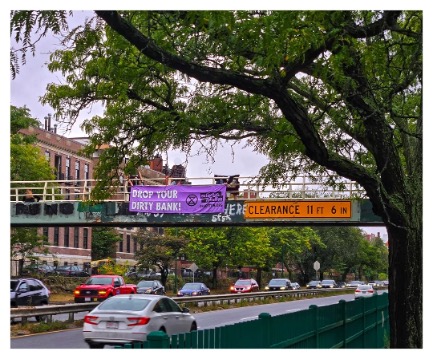
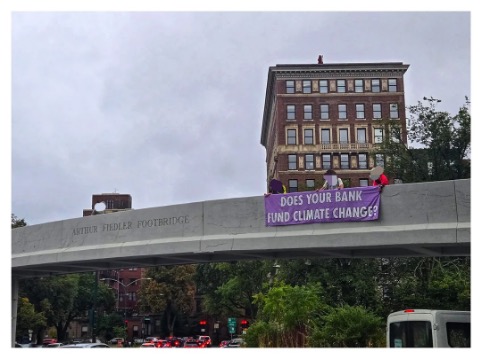
Photos: XR Boston
September 18, 2025 | Boston, USA
On September 18, 2025, our Boston rebels lit up the morning commute with bold “Drop Dirty Banks” and “Does Your Bank Fund Climate Change?” banners draped over several footbridges, calling out Wall Street giants for bankrolling climate chaos and war. The Rebels blasted large banks like Chase, Citi, Wells Fargo, Bank of America, and TD (these banks alone contributed $175 billion in 2022!) for pouring trillions into the oil, gas, and weapons industries while pretending to be climate champions.
The purpose of these banners was to draw the attention of road users to the fact that these engines of destruction profit from burning the planet and human suffering, and that it is crucial to divest. As we have seen with boycotts, our money is power, and keeping it in complicit banks only fuels the crisis – withdrawing from these banks sends a direct message that we no longer want to be part of this.
This marks the second time Boston rebels have staged a non-violent protest drawing attention to banks that finance fossil fuels, aiming to raise public awareness and push for accountability in the financial sector. Read more here. Here is a list of dirty banks, and here are some better banks. Follow XR Boston here.
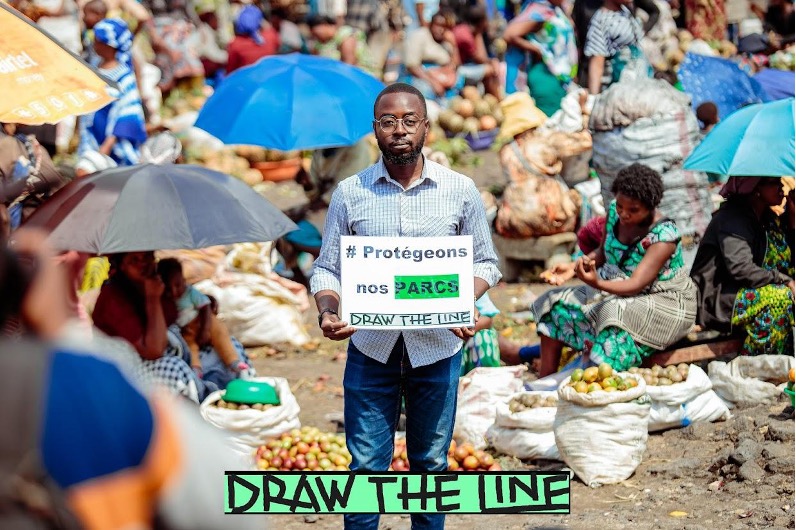
Photo: XR Graben
September 15–21, 2025 | DRC
Draw the Line was a global week of events from September 15–21, 2025, culminating in a weekend of rallies, marches, and artistic interventions. Thousands of people worldwide united to show strength and resistance, calling on world leaders to take urgent and decisive climate action ahead of COP30. Draw the Line is against inequalities, tyranny, genocide, destruction, and chaos and for rights, jobs, justice, democracy, and a fulfilling life on a safe planet.
In the Democratic Republic of Congo (DRC), the campaign inspired a series of non-violent actions, including a significant clean-up activity along Lake Kivu in Goma’s Kituku neighborhood. This initiative was carried out in collaboration with Rebels in Graben, Climate Clock DRC, and the RCC DRC Network on Climate Change. The clean-up aimed to raise awareness about the environmental risks posed by fossil fuel exploitation in the region, particularly the proposed sale of 52 oil blocks in the Cuvette Centrale peatlands. This landscape is the world’s largest continuous tropical peatland located in the Congo Basin and covering approximately 145,529 square kilometers. With the peatlands under threat, this raises the questions about the future of the Green Corridor, biodiversity protection and conservation efforts. Follow XR Graben here.
Positive News
Creatures buried in soil for over a century burst back to life in Toronto waterfront
Given enough time, nature finds ways to heal itself. Over 100 years ago in Toronto Canada, the city buried wetlands in over 25 feet of soil. Burying the wetlands enabled the city to develop an industrial site on the watery coastal area, killing that ecosystem – or so they thought. A recent waterfront revitalization project revealed a stunning development. As the city began removing the soil that buried the wetlands, scientists found that seeds and microorganisms were alive and growing!
People have filled in wetlands for centuries, this project shows that there is hope that these ecosystems can slowly restore themselves if given the chance. Read the full story here.
Must Read
Carbon emissions from oil giants directly linked to dozens of deadly heatwaves for first time
Big Oil just got a lot harder to defend. In a world where it can feel hard to keep the faith, something seismic has just happened. As the Guardian reports, a landmark study recently published in Nature directly connects the emissions of the world’s largest fossil fuel polluters to the rising frequency and intensity of extreme heatwaves. Hailed as a “leap forward that could be used to support future climate lawsuits”, the study has been received with jubilation by environmentalists.
Dispatch from Gaza
At the beginning of October, the Global Sumud Flotilla, a non-violent effort to break the blockade of Gaza, was entirely intercepted with all 44 boats seized by the Israeli forces. 462 heroes from over 45 countries took part in the flotilla, representing a peaceful attempt to deliver humanitarian aid to the Palestinian people. The flotilla’s mission highlights the importance of civil action and intervention through boycotts, protests, donations, and, most importantly, education.
This development in the ongoing Palestinian genocide once again exposes the relentless suffering endured by civilians, the severe limitations placed on humanitarian assistance, and the global community’s continued failure to hold Israel accountable or ensure justice for the Palestinian people. As of this writing, a ceasefire has been agreed upon and already broken. Support Palestine and get updates here.
Quick Watch
The Light Won’t Dim is Bill McKibben’s new 30-minute documentary from Fossil Free Media about solar power: the beautiful and liberating power of the sun. Unlike an oil refinery or a nuclear power plant, solar power is available to almost everyone, either at home or in the community. This gentle documentary, which opens with nuns from the Centro Buen Pastor in Puerto Rico, shows the life-changing power of solar for underserved communities. The film also highlights the ways that solar power can happen in spite of the current American administration and how, when climate disasters occur, it’s solar power that is up and running first. McKibben states the obvious but oft-forgotten basic facts: “We can power ourselves without breaking our planet…instead of depending on a few places around the world that have concentrations of fossil fuels and on the people who own those concentrations and end up with way more power than they should. We have an entire planet able to power itself… because everybody has sun and everybody has wind, and nobody can hoard it.” The Light Won’t Dim will inspire you to look around and see where you can install some solar in your community.
Book Review
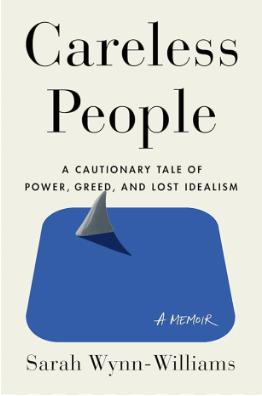
Careless People by Sarah Wynn- Williams
Sarah Wynn-Williams worked in the upper echelons of Facebook (now Meta) for 6 years. She tells us in Careless People: A Cautionary Tale of Power, Greed and Lost Idealism that she pushed hard to join the company because she really believed that Facebook would positively change the world. But as we know now, that isn’t what happened.
The apt title of Wynn-Williams’ book comes from F. Scott Fitzgerald’s book, The Great Gatsby: “They were careless people, Tom and Daisy – they smashed up things and creatures and then retreated back into their money or their vast carelessness or whatever it was that kept them together, and let other people clean up the mess they had made”.
Wynn-Williams gives us a candid, close-up account of her life at Facebook, including her many dealings with Sheryl Sandberg and Mark Zuckerberg. Wynn-Williams takes pains to reassure us that she was one of the good ones. Her style is clear and fast-paced, and she dishes the dirt.
Most readers will think they already know how bad Facebook is – from undermining democracy, to sowing division and harming young people. But Facebook has repeatedly portrayed itself as the victim of its runaway success – things just went viral and users around the world adapted the platform to their own needs so quickly. What could Facebook do??? But Wynn-Williams takes us into the rooms (and private planes) where decisions about all these areas were very intentionally made. And each time, pure capitalist greed trampled every single red flag raised by lower-down employees. Evil was incentivized.
Social media is part of most of our lives and has been fundamental to the impact of groups like XR, but the decisions made by Mark Zuckerberg, Meta’s chairman, chief executive officer, and controlling shareholder have made almost everything single bad thing in the world way worse, including the climate crisis.
Avoid Amazon. Support local bookshops in person when you can. Online buy your books at Bookshop or Hive(UK).
Ancestors of XR

René Jules Dubos (1901–1982)
French-American microbiologist René Jules Dubos was a man well ahead of his time, widely known for coining the environmentalist’s mantra “Think globally, act locally” in the 1970s. This call to consider the wider ecological impact of our choices has been hijacked as a slogan for all manner of things, but it was pretty revolutionary at the time.
Born in rural France in 1901, Dubos dreamed of becoming a cycling or tennis champion before an incapacitating attack of rheumatic fever at the age of eight forced a rethink. As a young man he found the study of microbiology “intensely boring”, and told his mother he would never again enter a laboratory. And yet… after reading an article by soil microbiologist Sergei Winogradsky, who suggested that “microorganisms should be studied not in artificial laboratory cultures but in their natural environments in competition with other bacteria”, Dubos embraced this ecological approach and embarked on a path that would lead him to become a famous microbiologist in America.
His early work focused on tuberculosis and pneumonia, and he helped pioneer antibiotics in the 1940s – although he had the foresight to warn that bacteria might become resistant to them over time. As his career unfolded, Dubos looked beyond the microscope to investigate overall patterns of disease. He found links between human wellbeing, environment, and lifestyle, and began to question the broader meaning of health and progress.
Dubos viewed the human body holistically as part of its surrounding ecosystem and wrote about how the conditions in your body can alter the course of a disease. For instance, if you’re stressed, your immune system is weakened, so bacteria that are already present but unnoticed can flare up into disease. These were groundbreaking ideas at the time.
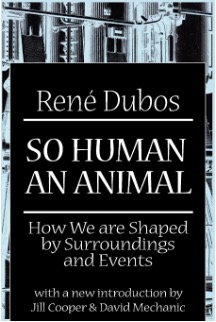
Among the many books Dubos wrote, his 1968 Pulitzer Prize-winner So Human an Animal: How We Are Shaped by Surroundings and Events was an early warning about the dehumanizing effects of modern civilization. He believed our industrial society and reliance on technological convenience eroded humanity’s connection to nature, community, and any sense of purpose – making us “less human”. With hindsight, this was a prophetic precursor to today’s debates about mental health and urban alienation. Dubos’s philosophical and scientific thinking inspired Earth Day, first held in the US on 22 April 1970, a foundational event that helped launch the modern environmental movement.
René Dubos died in 1982, but his influence endures in his message that grassroots actions and stewardship at the local level are the way to protect our planet as a whole.
Worth a Second Look

The ‘Desert’ was Already Blooming: Palestine, Colonialism and Global Climate Justice
To some people, the climate crisis is one thing and the fight for a free Palestine is something completely unrelated. But colonialism, extractivism, and oppression are intricately intertwined and always have been all over the world and particularly in Palestine. This article from 2022 clearly lays it all out and is essential background for what is happening today. As Shireen Tawil explains, “In Palestine, green colonialism has been central to Israel’s ethnic cleansing of Palestinian society, cheerily embodied in the catchy slogan that it will ‘make the desert bloom’, while nefariously masking land seizures and displacements of Palestinian communities”.
From our Readers
We’d like to hear from you! Please participate in our short, anonymous Reader Survey – we need your feedback! We also appreciate hearing from readers via email. If you’d like to send us a Letter to the Editor for potential future publication, please email us at: xr-newsletter@protonmail.com
XR Global Newsletter Reader Survey
Call to XR Local and National Groups – Map Updating
Please check the global XR map for your group’s details and contacts and send updates to contact@rebellion.global
Forward this newsletter to a friend. If this was forwarded to you, join us and subscribe to the XR Global Newsletter. If you have any questions or feedback, we want to hear from you. Get in touch at xr-newsletter@protonmail.com
P.S. Forwarding this newsletter to one person is an easy way you can help the planet today.
Great Job Extinction Rebellion & the Team @ Ecological & Climate Change News | Extinction Rebellion Source link for sharing this story.

